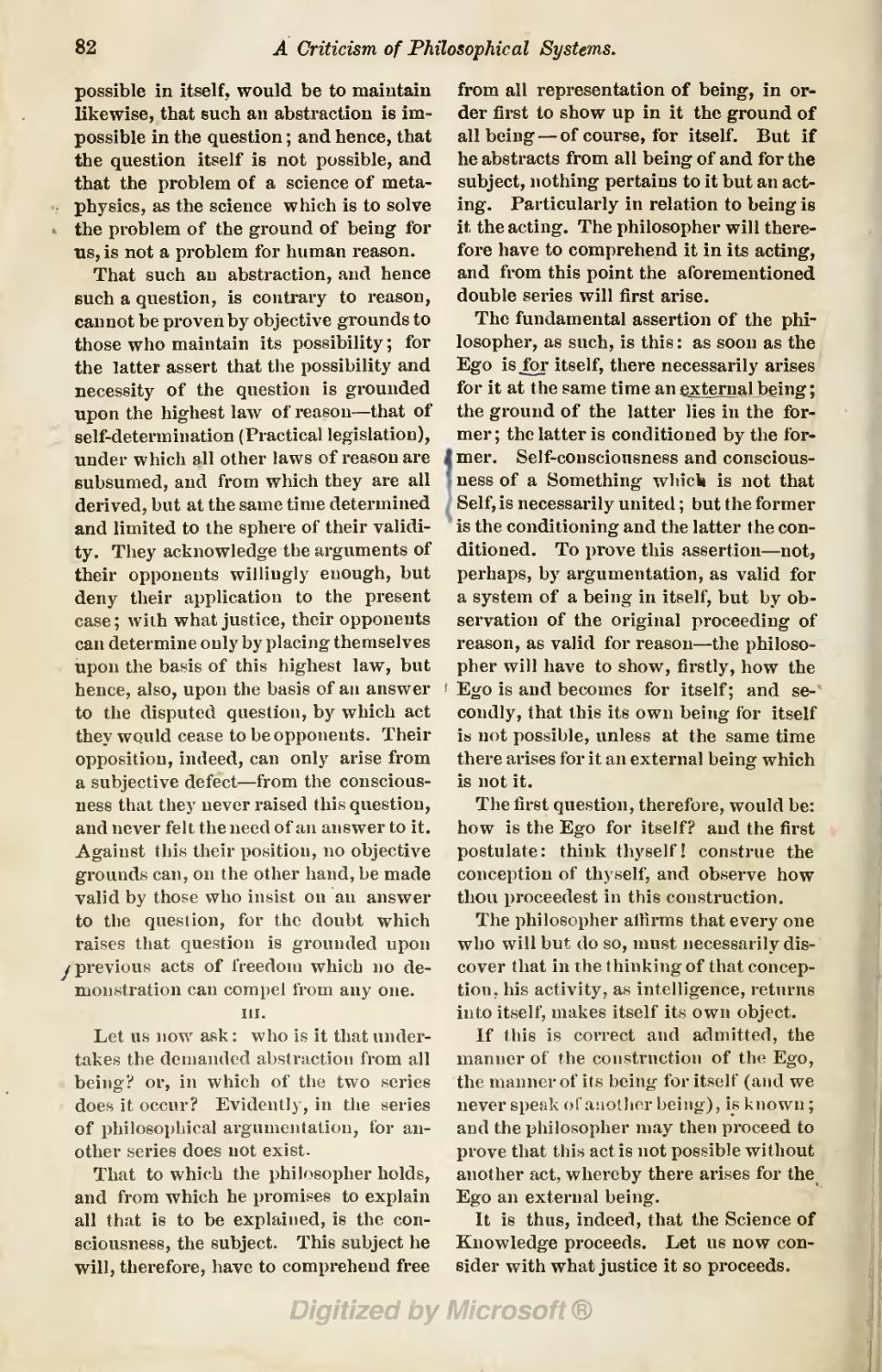possible in itself, would be to maintain likewise, that such an abstraction is impossible in the question; and hence, that the question itself is not possible, and that the problem of a science of metaphysics, as the science which is to solve the problem of the ground of being for us, is not a problem for human reason.
That such an abstraction, and hence such a question, is contrary to reason, cannot be proven by objective grounds to those who maintain its possibility; for the latter assert that the possibility and necessity of the question is grounded upon the highest law of reason—that of self-determination (Practical legislation), under which all other laws of reason are subsumed, and from which they are all derived, but at the same time determined and limited to the sphere of their validity. They acknowledge the arguments of their opponents willingly enough, but deny their application to the present case; with what justice, their opponents can determine only by placing themselves upon the basis of this highest law, but hence, also, upon the basis of an answer to the disputed question, by which act they would cease to be opponents. Their opposition, indeed, can only arise from a subjective defect—from the consciousness that they never raised this question, and never felt the need of an answer to it. Against this their position, no objective grounds can, on the other hand, be made valid by those who insist on an answer to the question, for the doubt which raises that question is grounded upon previous acts of freedom which no demonstration can compel from any one.
Let us now ask: who is it that undertakes the demanded abstraction from all being? or, in which of the two series does it occur? Evidently, in the series of philosophical argumentation, for another series does not exist.
That to which the philosopher holds, and from which he promises to explain all that is to be explained, is the consciousness, the subject. This subject he will, therefore, have to comprehend free from all representation of being, in order first to show up in it the ground of all being—of course, for itself. But if he abstracts from all being of and for the subject, nothing pertains to it but an acting. Particularly in relation to being is it the acting. The philosopher will therefore have to comprehend it in its acting, and from this point the aforementioned double series will first arise.
The fundamental assertion of the philosopher, as such, is this: as soon as the Ego is for itself, there necessarily arises for it at the same time an external being; the ground of the latter lies in the former; the latter is conditioned by the former. Self-consciousness and consciousness of a Something which is not that Self, is necessarily united; but the former is the conditioning and the latter the conditioned. To prove this assertion—not, perhaps, by argumentation, as valid for a system of a being in itself, but by observation of the original proceeding of reason, as valid for reason—the philosopher will have to show, firstly, how the Ego is and becomes for itself; and secondly, that this its own being for itself is not possible, unless at the same time there arises for it an external being which is not it.
The first question, therefore, would be: how is the Ego for itself? and the first postulate: think thyself! construe the conception of thyself, and observe how thou proceedest in this construction.
The philosopher affirms that every one who will but do so, must necessarily discover that in the thinking of that conception, his activity, as intelligence, returns into itself, makes itself its own object.
If this is correct and admitted, the manner of the construction of the Ego, the manner of its being for itself (and we never speak of another being), is known; and the philosopher may then proceed to prove that this act is not possible without another act, whereby there arises for the Ego an external being.
It is thus, indeed, that the Science of Knowledge proceeds. Let us now consider with what justice it so proceeds.
